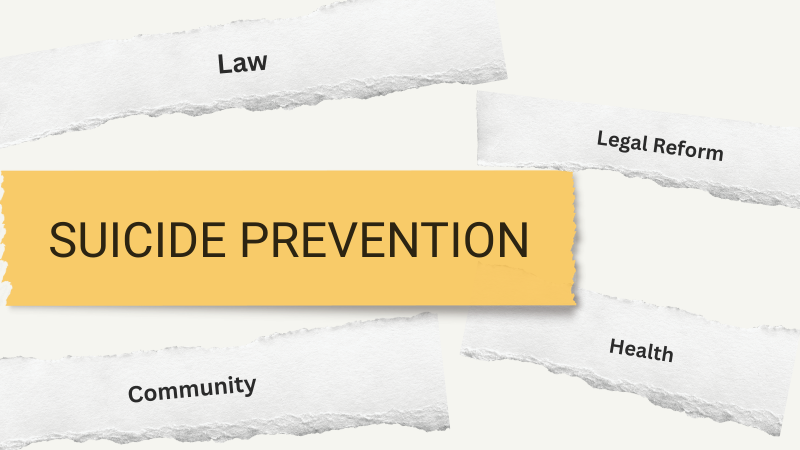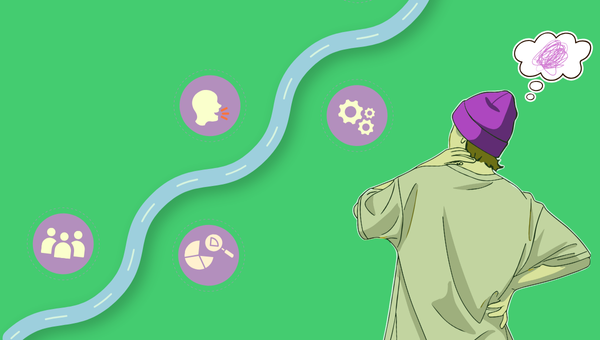In India, section 309 of the colonial era Indian Penal Code (IPC) has long classified attempted suicide as a criminal offence, subjecting those in crisis to potential imprisonment or fines. The criminalisation of attempted suicide punishes individuals when they are vulnerable and distressed. While the Mental Healthcare Act, 2017 (MHCA) decriminalises attempted suicide for all practical purposes, section 309 of the IPC continued to remain a legal provision resulting in considerable confusion among relevant stakeholders on how the MHCA provision and section 309 interact in daily clinical practice. However, a transformative shift is on the horizon with the Bharatiya Nyaya Sanhita 2023 (BNS), set to replace the IPC once it is passed by the Parliament. This new legislation no longer has provisions criminalising attempted suicide.
Support instead of punishment for attempted suicide
Criminalising attempted suicide contributes to a culture that places blame on individuals who contemplate suicide, discouraging them from seeking professional help. Another worrying consequence is that it deters individuals from reporting such incidents due to the fear of social stigma and legal repercussions. This, in turn, prevents accurate collection of data that is essential for developing suicide prevention strategies.
In this context, the explicit decriminalisation of attempted suicide by the BNS is a welcome step towards destigmatisation of suicides and attempted suicides.
The case for decriminalisation
Evidence about the impact of decriminalisation on suicide rates is mixed. A recent study of 171 countries found that the criminalisation of attempted suicide was associated with slightly higher suicide rates. However, in Asia, both Sri Lanka and Singapore saw suicide rates reduce after decriminalisation. Suicides and suicide attempts are often underreported when attempted suicide is a criminal offence. This could mean that the higher rates recorded post-decriminalisation are attributable to more accurate reporting. Regardless, decriminalisation is likely to lead to lesser stigma and timely help-seeking. Given that a prior suicide attempt is a strong predictor for another attempt, providing mental health support rather than punishing those who attempt suicide is essential for suicide prevention.
Previous attempts to decriminalise attempted suicide
India's first attempt towards decriminalising attempted suicide was in 1978, where an IPC amendment bill was introduced and passed in the Rajya Sabha. Before it could be passed in the Lok Sabha however, the Lok Sabha was dissolved, and the bill lapsed.
The next attempt came nearly 40 years later in the form of the Mental Healthcare Act, 2017 (MHCA). Section 115 of the MHCA states that attempted suicide is to be considered the result of severe stress, and the individual is not to be prosecuted. Instead, it places an onus on the government to ensure that a person has access to support services.
While section 115 effectively decriminalised attempted suicide, the lingering presence of section 309 in the IPC led to the harassment of some individuals by police officials under the pretext of being booked under section 309.
After the introduction of section 115 in the MHCA, the steps followed when a person presented to a hospital after a suicide attempt involved:
- Assessment and triaging in the emergency room
- Stabilisation of the person
- Registration of a medicolegal case with the police, and admission if required
- Mandatory psychiatric referral of the person for assessment and treatment
- Informing the person about section 115 of the MHCA
- Inquiry by the police to understand whether someone abetted the suicide attempt
- Discharge planning and follow-up care
This registering of medicolegal cases and inquiry by the police continued to discourage reporting of suicide attempts to avoid legal consequences and stigma.
What does the BNS Section 309 mean in terms of attempted suicide illegal?
The new bill removes section 309 of the IPC entirely. This means attempted suicide will no longer be a criminal offence. However, attempted suicide as a means of preventing a public servant from carrying out their duty is still a punishable offence.
Section 224: Whoever attempts to commit suicide with the intent to compel or restrain any public servant from discharging his official duty shall be punished with simple imprisonment for a term which may extend to one year or with fine or with both or with community service.
This is probably an outcome of the government's efforts to deter self-immolation or hunger strikes. Back in 2014, in response to a query in the Rajya Sabha, it was revealed that 22 states and union territories supported the idea of scrapping section 309. However, 5 states held the opposing view, contending that section 309 should remain intact. Their reasons varied, from a desire to impart a lesson to individuals attempting hunger strikes to concerns about keeping potential sacrifice bombing incidents in check. A notable point is that in this section of the BNS, community service is provided as an alternative punitive option, a less severe form of punishment than imprisonment or fines.
On the ground, repealing section 309 should translate to attempted suicides not needing to be registered as medicolegal cases. To smoothly pave the way for decriminalisation, it is essential for the Ministry of Home Affairs to provide clear guidelines to the police and frontline workers about the decriminalisation of attempted suicide and its implications on medicolegal cases. It is also imperative to increase awareness and enhance skills of first responders to provide emergency psychosocial support. These first responders include the police, emergency healthcare providers, mental health experts, peer supporters, and other individuals who encounter individuals at risk of suicide. It is equally important to educate the police about the decriminalisation of attempted suicide and the importance of referring individuals who have attempted suicide to appropriate medical care. Creating robust systems for swift referrals, assessments, and both short-term and long-term care can significantly bolster suicide prevention efforts.
In this evolving legal landscape, one aspect that raises questions is the abetment of suicide. Abetment of suicide, which was a punishable offence in the IPC, remains so in the BNS. Additionally, section 194 of the Bharatiya Nagarik Suraksha Sanhita (BNSS), the 2023 replacement for the older Criminal Procedure Code, states that the police, upon being informed that an individual has died by suicide, should carry out an inquest. However, what this section does not address is the critical issue of attempted suicide. It is unclear how abetment of attempted suicide will be investigated when medicolegal cases are not registered. Frontline workers could be equipped with the knowledge and skills to briefly inquire about any potential abetment in cases of attempted suicide. This approach could help prevent unnecessary involvement of the police in situations where their intervention may not be warranted. In such instances, it would be crucial for the Ministry of Home Affairs to provide comprehensive guidelines about the procedural handling of abetment of attempted suicides.
Preparing for decriminalisation: the way forward
The Ministry of Home Affairs currently issues annual reports on suicide statistics through the National Crime Records Bureau (NCRB). While it is widely acknowledged that these numbers likely underestimate the true scope of the problem due to underreporting, they still offer valuable insights into the rates, distribution, and reasons behind suicides in our country.
Once the BNS is passed and attempted suicide is no longer a criminal offence, there will be a pressing need to rethink how suicide cases are recorded and documented. Accurate and comprehensive recording of suicide deaths is of paramount importance for gaining a deeper understanding of the issue, crafting effective targeted prevention strategies, and extending the right support to those in crisis. To accomplish this, it will first be essential to train medical professionals to appropriately identify and document suicides and suicide attempts. Further, establishing a centralised database dedicated to recording such cases will be essential. This database will serve as a resource for researchers, policymakers, and mental health advocates striving to tackle suicide prevention. Efforts towards community surveillance in India are also underway to address the challenge of underreporting of suicides and suicide attempts.
The journey towards decriminalising attempted suicide goes beyond mere legal changes. To support this endeavour, the World Health Organization (WHO) has released a policy brief on effective suicide decriminalisation. This brief not only advocates for the repeal of laws that criminalise attempted suicide but also outlines a broader roadmap. It suggests the implementation of a post-decriminalisation awareness and training program designed for various stakeholders involved in suicide prevention.
Further, the WHO brief encourages the development of a national suicide prevention strategy. With the publication of the National Suicide Prevention Strategy in India and the impending decriminalisation of suicide, the role of police officers and healthcare workers needs to be rethought, and concrete operational guidelines must be developed. Projects are underway in this regard: the Contact and Safety Planning project in Chhattisgarh trains nurses and community health officers to reduce suicides in individuals who have attempted suicide, and the STRIDE project involves working with the police and other law enforcement agencies to strengthen suicide prevention efforts in Odisha. The brief also pushes for suicide rates to be reported within health statistics rather than crime statistics. It goes on to provide guidelines about developing mental health services at the community level. These services should prioritise non-coercive and rights-based treatments, ensuring individuals receive the care they deserve.
As we anticipate the passing and enactment of the Bharatiya Nyaya Sanhita, it is important to recognise this as a significant milestone in the decriminalisation process. However, its success hinges on a collaborative effort that includes implementing the recommendations laid out by the WHO. By doing so, we can support not just the legal transition but also the broader transformation toward a more effective approach to suicide prevention.
Authored by Ramya Pillutla, a Research Associate at the Centre for Mental Health Law & Policy, Indian Law Society, Pune.



